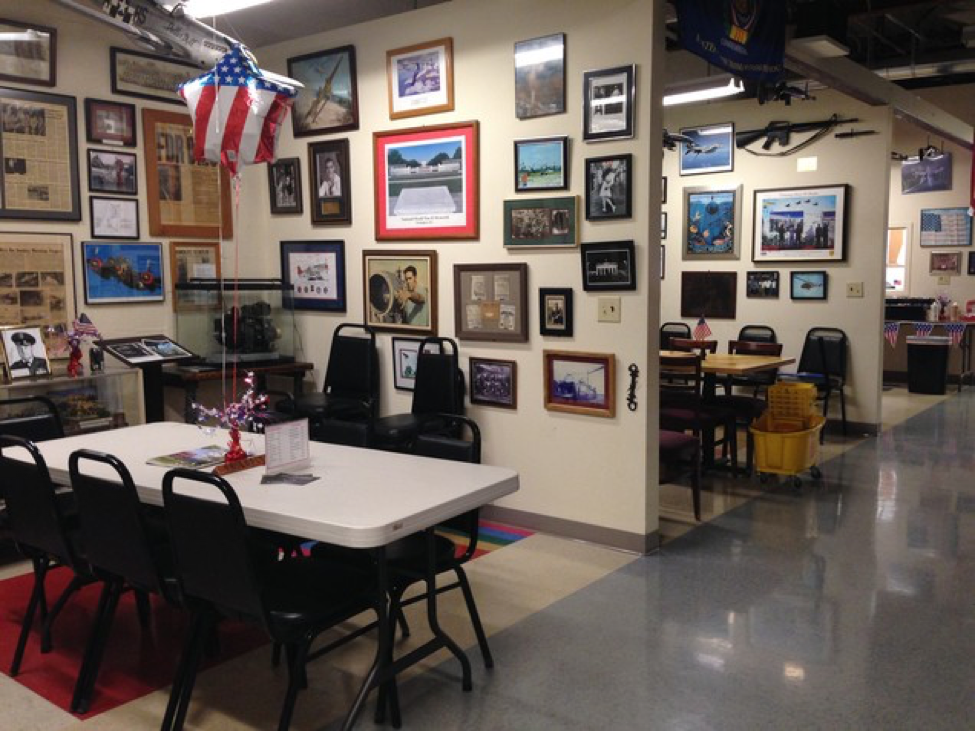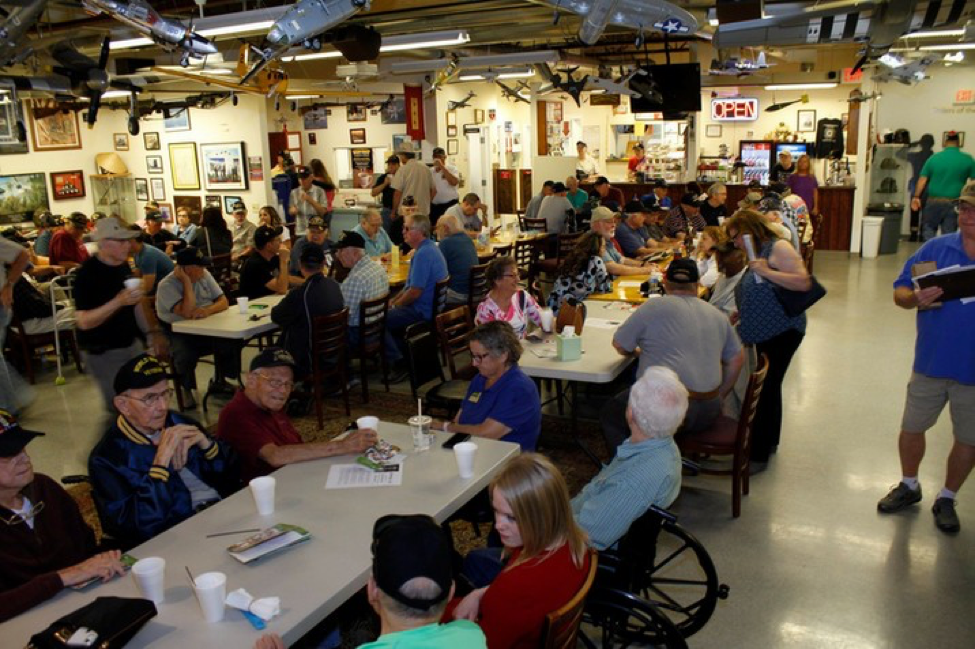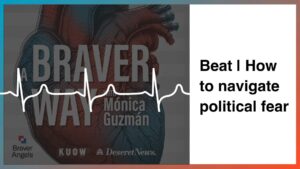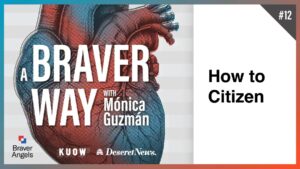In 2002 I walked through the door of Richard’s Coffee Shop in Mooresville, North Carolina, with a guitar case and my two young children. I was greeted with a mixture of amusement and suspicion. The owner, Richard, served a mostly adult clientele, and he liked it that way. He had opened the shop in 1999 as a place for veterans to gather and build community. The coffee and pastries were just window dressing, as was the idea of hosting an acoustic jam session on Saturday mornings. Everything revolved around making veterans feel welcome, including providing food and entertainment for them to enjoy. The jam sessions had taken off independently, though; most Saturdays, you couldn’t find an empty table in the shop, and the crowd was more than half civilians.

Private tables for veteran gatherings at the Living Military Museum in Mooresville, NC
I had come to the jam seeking music, yes, but more importantly, I was seeking cultural bridges. I was a young faculty spouse at Davidson College, and I’d become concerned that my children were only exposed to one demographic—the upper-middle-class, well-educated, mostly-white-but-dedicated-to-diversity, liberal elite of a college town near a major city. At Richard’s Coffee Shop, we encountered country people with backwoods grammar and strong accents, scenes reminiscent of my childhood in rural Tennessee, scenes that were strangely rare in the posh town of Davidson just five miles from Richard’s Coffee Shop. I found a slower pace and less competitive atmosphere than in our weekday life. And the music was great! I sang and played rudimentary guitar by ear, and the children were both musical, so bluegrass and the folk tradition seemed to be the perfect new family pastime for us to enjoy together, while getting to know some wonderful people we would never have met in Davidson.
I took out my guitar and stashed the case with the other instrument cases in the corner. Sophie, my 3-year-old, was fascinated by the cases, their different shapes, their potential as building blocks for playhouses. That first day, having noticed Richard’s watchful eye behind the counter, I made sure to keep her close to me as she ate her muffin on my lap, making sure that neither crumbs nor sticky fingers would draw justified criticism from our host. Ruth, my 5-year-old, was already fascinated by the music. The mandolin was their favorite that day. Ruth and Sophie were definitely the youngest people present; the musicians were mostly white men over 60 dressed in baseball caps and jeans or overalls. The audience was more balanced in gender, but still a gray-haired demographic. We had walked into a room of extra grandparents! Sophie would soon have plenty of grandmotherly laps on which to eat her muffins.
All of us musicians sat in a circle, sometimes two chairs deep, and song choices moved roughly around the circle, someone occasionally calling out an inspired idea out of turn. It was understood that the whole group was invited to play along on every song; the atmosphere was entirely participatory and collaborative, and people who brought their own showpieces to perform found out quickly that “jam busters,” songs too complex to pick up on the fly, were not appreciated. Beginner instrumentalists were encouraged to take a solo break between verses, sometimes alongside a more experienced player, sometimes alone. I learned to hold a flat pick properly, and developed a passable rhythm guitar style to replace my aimless campfire strumming. Over many Saturday visits to the jam sessions, the children learned lots of lyrics, and Ruth became a natural harmony singer. And we all made plenty of friends. Soon Richard would shake his head and smile indulgently as Sophie built her weekly playhouse out of instrument cases and lay down for a nap. The children became great favorites at Richard’s Coffee Shop.
I enjoyed talking to veterans, hearing their stories, finding out their favorite songs so we could play them in the circle. I was proud to demonstrate, by my presence and by my children’s presence, that popular stereotypes of college professors and their families were not always correct—we were not there to look down on anyone, or to make fun of patriotism, or to scold people for narrow-mindedness. We were there to learn music and to meet people. I believe it was good for everyone involved to get to know real human beings whose paths we would not have crossed in ordinary life. It was the music that made the crossings possible, for the veterans, for the grandmothers, for Richard and my children and me.
Today, Richard is gone and his coffee shop has moved a block away to a much larger space. The local veterans fulfilled his long-held dream of establishing a veterans’ museum of living history, where the coffee shop lives on. Coffee (no lattes, nothing frou-frou) and pastries are still available at the counter. But the coffee tables now sit among artifacts from all the wars the United States has ever fought—uniforms from every branch of service, plaques and medals on the walls, model planes and ships suspended from the ceiling.
There is still Saturday music, too, but I have at least one friend who says he had to stop going after the 2016 election because the atmosphere had grown so polarized. I was surprised and sad to hear that report, because although I was always in the minority as a liberal in a redder environment, I had felt both respected and welcomed. There was room, back then, for people to know one another as individuals.

The new Richard’s Coffee Shop, inside the Living Military Museum, Mooresville, NC
I moved away from North Carolina in 2012, and I go back to the coffee shop about once a year when I’m visiting friends in Davidson. During my last visit, I mourned the loss of old friends who are gone now, and I tried not to mind when the well-meaning volunteer host took the mic during intermission and gave announcements with a bellicose air of taking a brave stand against the liberal cultural elite. I smiled at the new crop of beginners learning bluegrass standards in the circle. I pledged to remember the real individual people I made friends with in that place, and I hope they remember me as well. I’m not sure if we could become friends today, starting as strangers, given the greater levels of hostility and suspicion that divide our culture. But we can still play music together, and I will hold that door open while hoping (and working) for better times.




1 thought on “Bluegrass Bridge”
A lovely piece Cameron. Thank you! It’s funny how random certain cultural practices are though. You mentioned that they served only coffee (“no lattes, nothing frou-frou”). I get to travel to Italy a lot for work, and one of my favorite things to do is start my day off at the coffee bar. Of course, in Italy you don’t find American style coffee, but instead only cappuccino, espresso, etc. In Rome, I love going first thing in the morning when most of the city is still asleep to enjoy my cappuccino at the bar when the only people there are the trash collectors and street sweepers, not exactly what you think of as elites. But to them, those drinks are completely normal, not frou-frou at all. They would never drink American style coffee, and they want their cappuccinos well-made. I wonder what the folks at veterans’ coffee bar would think of that! Doesn’t it show just how random and arbitrary so many of our judgments are?